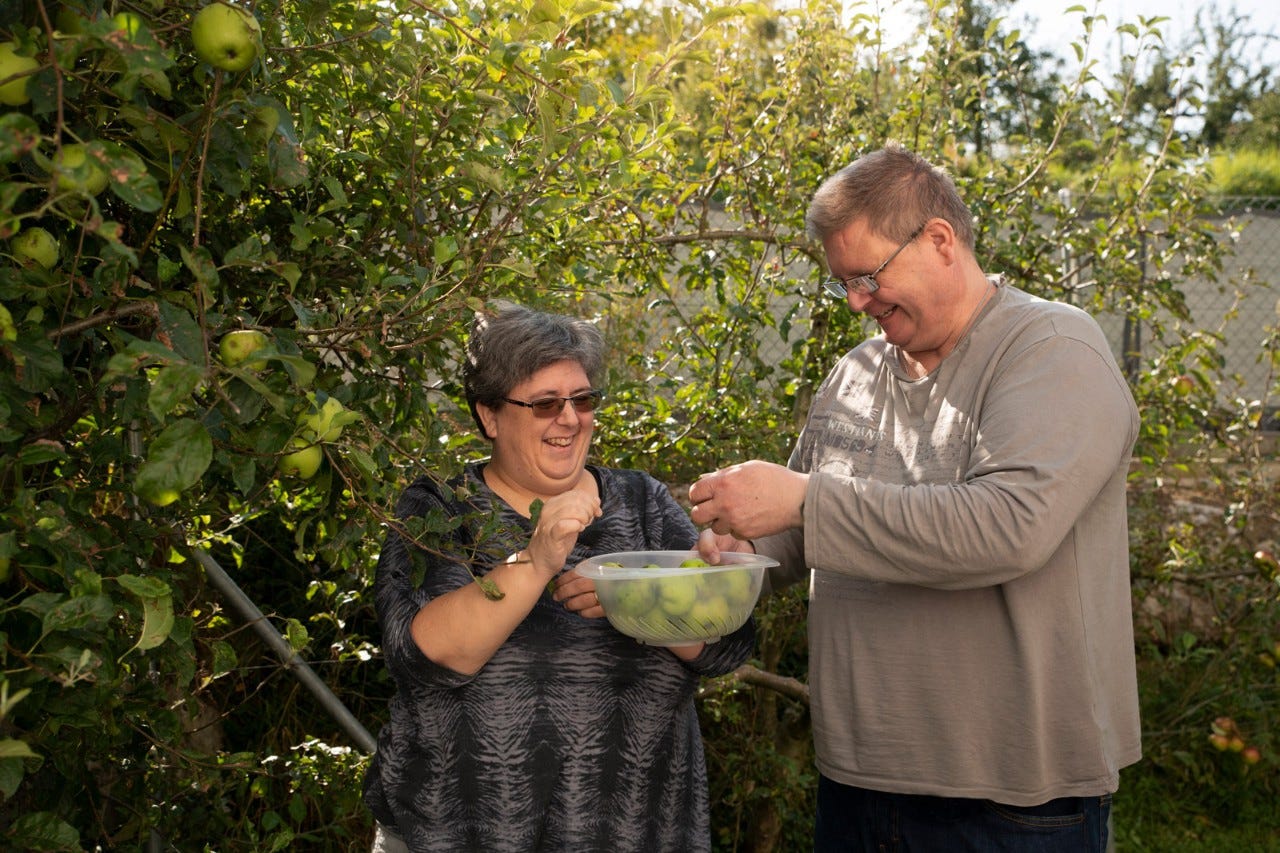“I’m not disabled, I have a special talent”
She’s autistic, he isn’t. How does a relationship work when two people experience the world so differently?

48 years. She’s been living with the vague feeling that something isn’t right for almost five decades. Half her life she has rubbed people up the wrong way without knowing why. Today Karin Lehmann is 52 and she can now put a name to this feeling after her diagnosis four years ago: Asperger’s.
It’s hard to recognise the other person’s emotions
It already smells like autumn when we meet. The last apples are being harvested in the garden. Her husband Frank will turn them into apple rings, which Karin loves to eat with custard. During our conversation, the most noticeable thing is ... that there is nothing to notice. Karin Lehmann looks her counterpart in the eye and laughs in all the right places. But she doesn't recognize what's happening on the other person's face. Karin Lehmann later tells me that she can’t interpret facial expressions. She can’t tell when someone looks sad, when the corners of their mouth drop in disappointment or when they furrow their brows in anger. This is one of the characteristics of Asperger syndrome.
Another is that she says exactly what she thinks. For example, she recently said to a colleague at work: “Stop talking and start working!” And then she went back to her work station. Karin didn’t think any more about it. When her colleague challenged her, she said: “That’s just the way I am. I have autism.” Karin is open about being different. And she passes this on as a tip for other people who have autism: "Try to explain what's going on with you guys. And the rest of you: ask why someone reacts the way they do. Don’t just write them off.”
Masking: the art of fitting in
She knows how it is to feel like an outsider. “I didn’t have any friends. Kids at school only approached me if they needed help with their maths homework.” She muddled through and learned a lot from other children. Female sufferers in particular become true masters of copying and adapting over time – one of the reasons why autism is discovered later in girls than in boys. As a child, she wished she had parents who would have had her diagnosed. “My mum always said: It’s just the way you are. And that was that.” Lehmann does not accept the excuse that parents don’t want to get their child diagnosed with autism, because it could harm them. “That is the parents’ fear, not the child’s. When children are diagnosed, they get help.”
““I would love to be a grandma who takes her grandchild on her knee and reads him a story,”
A breakdown led to the diagnosis of autism
Karin was only diagnosed after she had a breakdown. She worked at the post office for almost 20 years. It was particularly difficult when dealing with customers. Karin always worked conscientiously and to the best of her ability, but she lacked the necessary tact. Complaints flooded in and Karin was often called into her boss’ office until she finally broke down and was fired. It was then that she decided to seek clarity and went to a psychiatrist and underwent tests for autism at the University Psychiatric Services in Bern. “When I got the diagnosis, everything clicked into place. I finally had a reason for why I react the way I do. Why I open my mouth before switching on my brain.”
Learn what does you good
Today she can laugh about it. “At the post office, I looked at the counters to the right and left, saw how they did it and then organised a middle path for myself. I’ve got a photographic memory that lets me run through my thoughts like a film, and it often keeps playing at night.” She takes regular breaks to recover from all that she sees and hears. She can’t use public transport because it’s too busy and noisy. She takes the car to get to her new job. “When I’m stressed I turn the music up loud. It helps me unwind and I see the driving lane better.”
When she enters a room, she notices everything at a glance. It upsets her if something is not in the right place. Because of her stiffened thumb, Lehmann now works in a sheltered job in the secondary labour market. “The pressure is off. For 19 years I made it through the day on autopilot.” Now she works 50% and sends toothbrushes, baby rattles and dummies over the conveyor belt to be packaged. And calculates faster than the company’s computer.
People with Asperger’s have special talents
It hurts them when Asperger syndrome is spoken of as a disorder. “I’m not disabled, I have a special talent that can also be a gift. I only worked in a hospital for seven years, but when it comes down to it, my brain switches automatically to medicine. I know immediately what to do.” When my son was little, he crashed his bike and needed stitches. “With my husband, my son screamed non-stop, but with me he immediately quietened down. Because I was calm. At that moment, I saw him not as my son but as a patient. I was able to operate like a machine.” This way, we can always learn from each other. For example, her husband helped her learn to accept help when she needs it.
They have been together for 34 years since Frank spoke to her at the carousel at the local fair. They met again later in the evening when the fairground had long since emptied. They quickly became a couple. He says: "At the beginning, I didn't notice that she was different. We had our ups and downs, of course, like any couple. At some point she said: ‘Something isn’t right with me’. But I never suspected that she had autism.” It is important to Frank to emphasise that it isn’t a disease. “My wife has skills that others don’t have.” From the start she told him clearly what she liked and what not. “I can’t just give her a hug. She has to come to me. Otherwise she quickly feels hemmed in and withdraws.”
““We love each other. You don’t just abandon someone because they’re different.”
Touching is hard to bear
The couple has two children. Karin Lehmann says: “That’s when I really should have known what was wrong with me. I enjoyed breastfeeding, but later I couldn’t let my children sit on my lap. I couldn’t bear the mess. Or sticky fingers. I never hugged them, never gave them a goodnight kiss. My husband always put them to bed.” However, she was still close to her children in her own way. When I was diagnosed with Asperger’s, it also helped explain to them why their mum is the way she is. “Their partners also know. Even before corona, I never kissed people on the cheek as a greeting. That’s not the way I work.”
But it does hurt Karin that she is unable to form a close physical bond with her grandchild. “I would love to be a grandma who takes her grandchild on her knee and reads him a story, but I can’t bear the physical closeness.” Her husband accepted the way things were from the beginning. “We love each other. You don’t just abandon someone because they’re different. When she needs a break, she withdraws. I like that we are able to give each other space.” And she adds: “It works for us.”
Psychologist Matthias Huber, who himself is autistic, talks in the Sanitas Health Forecast podcast about how people on the autism spectrum feel and how they perceive the world.



